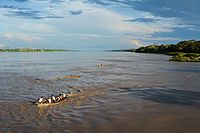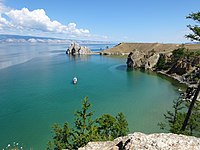
Back Vars water Afrikaans ماء عذب Arabic Agua dulce AST İçməli su Azerbaijani Прэсная вада Byelorussian Прясна вода Bulgarian ताजा पानी Bihari স্বাদু পানি Bengali/Bangla Slatka voda BS Aigua dolça Catalan
This section needs additional citations for verification. (November 2022) |
Fresh water or freshwater is any naturally occurring liquid or frozen water containing low concentrations of dissolved salts and other total dissolved solids. Although the term specifically excludes seawater and brackish water, it does include non-salty mineral-rich waters such as chalybeate springs. Fresh water may encompass frozen and meltwater in ice sheets, ice caps, glaciers, snowfields and icebergs, natural precipitations such as rainfall, snowfall, hail/sleet and graupel, and surface runoffs that form inland bodies of water such as wetlands, ponds, lakes, rivers, streams, as well as groundwater contained in aquifers, subterranean rivers and lakes. Fresh water is the water resource that is of the most and immediate use to humans.
Water is critical to the survival of all living organisms. Many organisms can thrive on salt water, but the great majority of vascular plants and most insects, amphibians, reptiles, mammals and birds need fresh water to survive.
Fresh water is not always potable water, that is, water safe to drink by humans. Much of the earth's fresh water (on the surface and groundwater) is to a substantial degree unsuitable for human consumption without some treatment. Fresh water can easily become polluted by human activities or due to naturally occurring processes, such as erosion. Fresh water makes up less than 3% of the world's water resources, and just 1% of that is readily available. Just 3% of it is extracted for human consumption. Agriculture uses roughly two thirds of all fresh water extracted from the environment.[1][2][3]
Fresh water is a renewable and variable, but finite natural resource. Fresh water is replenished through the process of the natural water cycle, in which water from seas, lakes, forests, land, rivers and reservoirs evaporates, forms clouds, and returns inland as precipitation.[4] Locally, however, if more fresh water is consumed through human activities than is naturally restored, this may result in reduced fresh water availability (or water scarcity) from surface and underground sources and can cause serious damage to surrounding and associated environments. Water pollution also reduces the availability of fresh water. Where available water resources are scarce, humans have developed technologies like desalination and wastewater recycling to stretch the available supply further. However, given the high cost (both capital and running costs) and - especially for desalination - energy requirements, those remain mostly niche applications. A non-sustainable alternative is using so-called "fossil water" from underground aquifers. As some of those aquifers formed hundreds of thousands or even millions of years ago when local climates were wetter (e.g. from one of the Green Sahara periods) and are not appreciably replenished under current climatic conditions - at least compared to drawdown, these aquifers form essentially non-renewable resources comparable to peat or lignite, which are also continuously formed in the current era but orders of magnitude slower than they are mined.
- ^ "Wastewater resource recovery can fix water insecurity and cut carbon emissions". European Investment Bank. Archived from the original on 29 August 2022. Retrieved 29 August 2022.
- ^ "Competing for Clean Water Has Led to a Crisis". Environment. 26 January 2010. Archived from the original on 19 February 2021. Retrieved 29 August 2022.
- ^ "Freshwater Resources | National Geographic Society". education.nationalgeographic.org. Archived from the original on 26 May 2022. Retrieved 29 August 2022.
- ^ "The Fundamentals of the Water Cycle". www.usgs.gov. Archived from the original on 27 November 2019. Retrieved 17 September 2021.
© MMXXIII Rich X Search. We shall prevail. All rights reserved. Rich X Search


